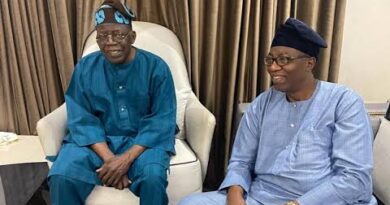Asiwaju Goes to Charlotte
By Pius Adesanmi
Asiwaju Bola Tinubu was at the just-concluded convention of the Democratic Party held in Charlotte. Glossy pictures are already circulating in social media. There is one of him clapping excitedly in the audience. There is another of him in an outside pose with one of his men Friday, Governor Kayode Fayemi of Ekiti state. On the surface, this is a good development. When a man of such enormous influence decides to come and observe and learn from the best democratic practices, the idea – only the idea – should be lauded. But observing and learning from the best practices in the world is an area in which Nigerian leaders and socio-political élite are not in good standing. Therefore, we need to know what Asiwaju and his entourage saw, heard, and learnt in Charlotte.
Indeed, Nigerians are eternally perplexed that the reproduction of modernity and postmodernity has remained rocket science for our political and social élite. Let me explain. If your understanding of the concrete expression of modernity and postmodernity lies in democracy, 21st century infrastructure, advancements in science and technology, and the creation of opportunities and a level playing field for the pursuit of happiness for the citizenry, you will discover that most non-Western societies – Japan, China, Singapore, South Korea, Malaysia, Dubai – that have achieved parity with or surpassed the West (especially in modern and postmodern infrastructure) have done so in great part by observing and copying. Indeed, the spread of the developmental and infrastructural aspects of modernity and postmodernity beyond the West is a study in the ability of the excluded to observe, copy, and adapt the end product to local-cultural conditions and circumstances. Aware of the existence of such things in the West, the élite of these societies spent much of the 19th and 20th centuries copying and reproducing them for their own peoples.
A Japanese official sees the French TGV or German ICE (super rapid trains) and begins to think of how to out-perform the French and the Germans by producing a more modern Japanese version of the trains but a Nigerian official sees the same trains in Germany or France and begins to think of how to buy homes in Germany or France in order to spend summer enjoying those trains; a Dubai crown prince sees an architectural wonder in New York (it could be a mall) and rushes back home to the task of constructing something bigger for the people of Dubai but a Nigerian official sees the same mall in New York and hurries home to steal money to come and shop in that mall next summer; a Chinese official sees the German autobahn and hurries home in nationalistic anticipation because better roads must be constructed in China but a Nigerian Governor sees the same autobahn in Germany and begins to make discreet inquiries into how to buy shares in the German company that constructed the said autobahn. If German financial regulations allow him, he will return to Berlin next year with his entire security vote to buy shares in that German company.
The Nigerian élite is incapable of replicating anything they see abroad. What they take back to Nigeria are the worst aspects of Western behaviour. Hence they return to Asokoro or Lekki with their fake amala, akpu, or gworo-coated accents, supercilious airs, and acquired Western consumption patterns. I’ve been in high-end restaurants in Lagos while folks who don’t know the difference between Merlot and Rosé would come in, order wine and cuisine from a menu they can barely read, and discuss their last European vacation loud enough for everybody to hear.
This is all our élite take back to Nigeria when they come here and that is why Nigerians should be very interested in what Asiwaju saw in Charlotte and what he took back home. What did he learn about internal party democracy? What did he learn about the power of ideas over money? What did he learn from the zero violence in back to back conventions? What are his concrete plans to translate such lessons into concrete, verifiable results in his southwest fief in particular and in Nigeria at large? In the same vein, Nigerians should also be interested in the things Asiwaju did not see and did not hear in Charlotte. The list is endless but I’ll limit myself to three:
1. Asiwaju did not hear that any Governor of the states controlled by the Democratic Party is in permanent financial bondage to Bill Clinton.
2. Asiwaju did not hear that Governors of the Democratic Party have ever collectively used taxpayers’ money to fund Bill Clinton’s birthday celebrations.
3. Asiwaju did not hear that companies owned by Bill Clinton or in which Bill Clinton has substantial interest somehow manage to corner most of the contracts in states controlled by Governors of the Democratic Party. He did not hear that Bill Clinton’s companies are operating concessions and toll gates in any state controlled by the Democrats.
Now, over to you. What else do you think Asiwaju did not see or hear in Charlotte?
“The only thing necessary for the triumph of evil is for good men to do nothing.”



